Classifications and Sources of Law in UK: Business Law Report
VerifiedAdded on 2023/06/18
|9
|2833
|79
AI Summary
This report discusses the classifications and sources of law in UK, including civil and criminal law, case law, legislation, and delegated legislation. It also covers the statutory duties of employers towards their employees and wrongful and unfair dismissal actions.
Contribute Materials
Your contribution can guide someone’s learning journey. Share your
documents today.
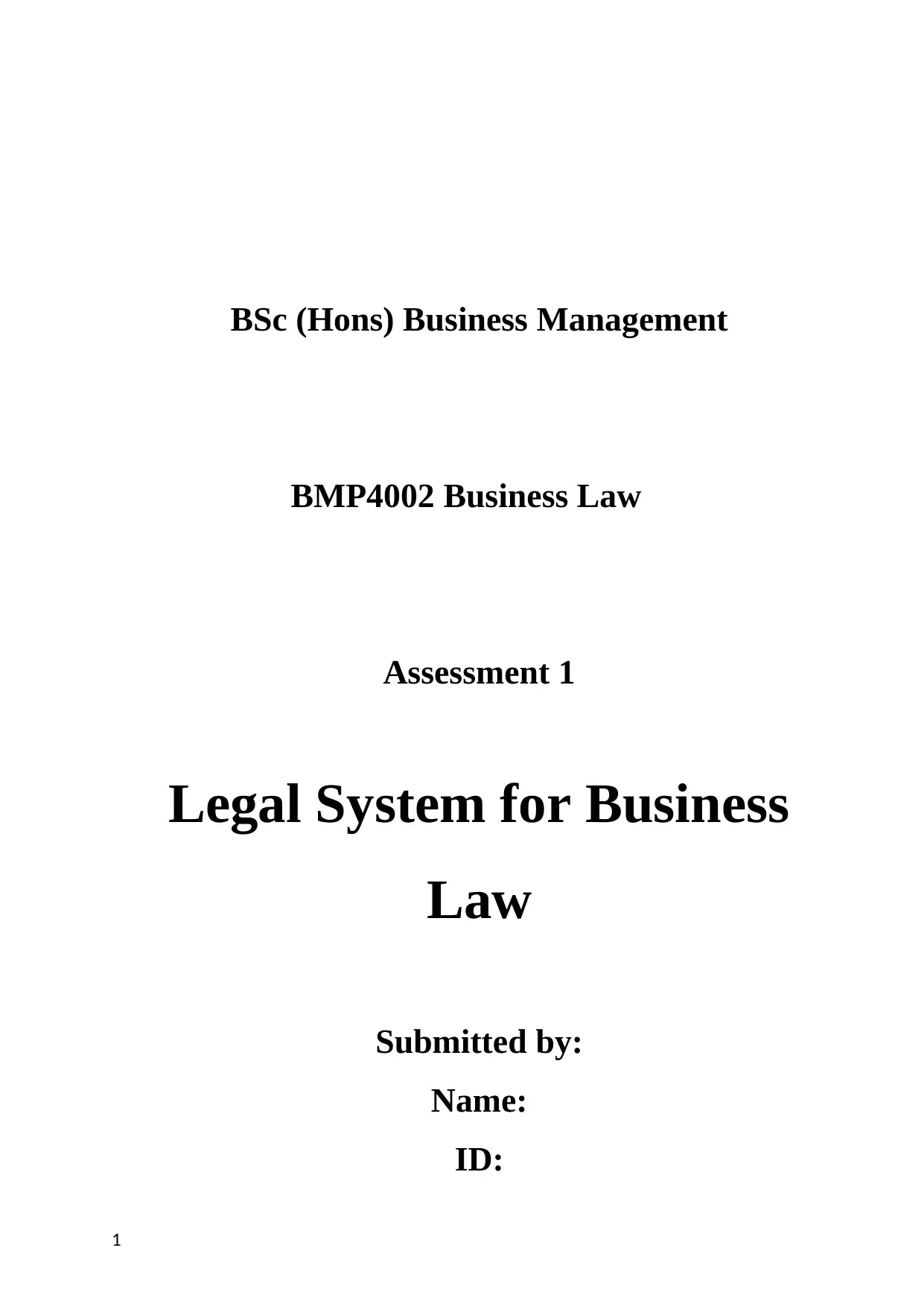
BSc (Hons) Business Management
BMP4002 Business Law
Assessment 1
Legal System for Business
Law
Submitted by:
Name:
ID:
1
BMP4002 Business Law
Assessment 1
Legal System for Business
Law
Submitted by:
Name:
ID:
1
Secure Best Marks with AI Grader
Need help grading? Try our AI Grader for instant feedback on your assignments.
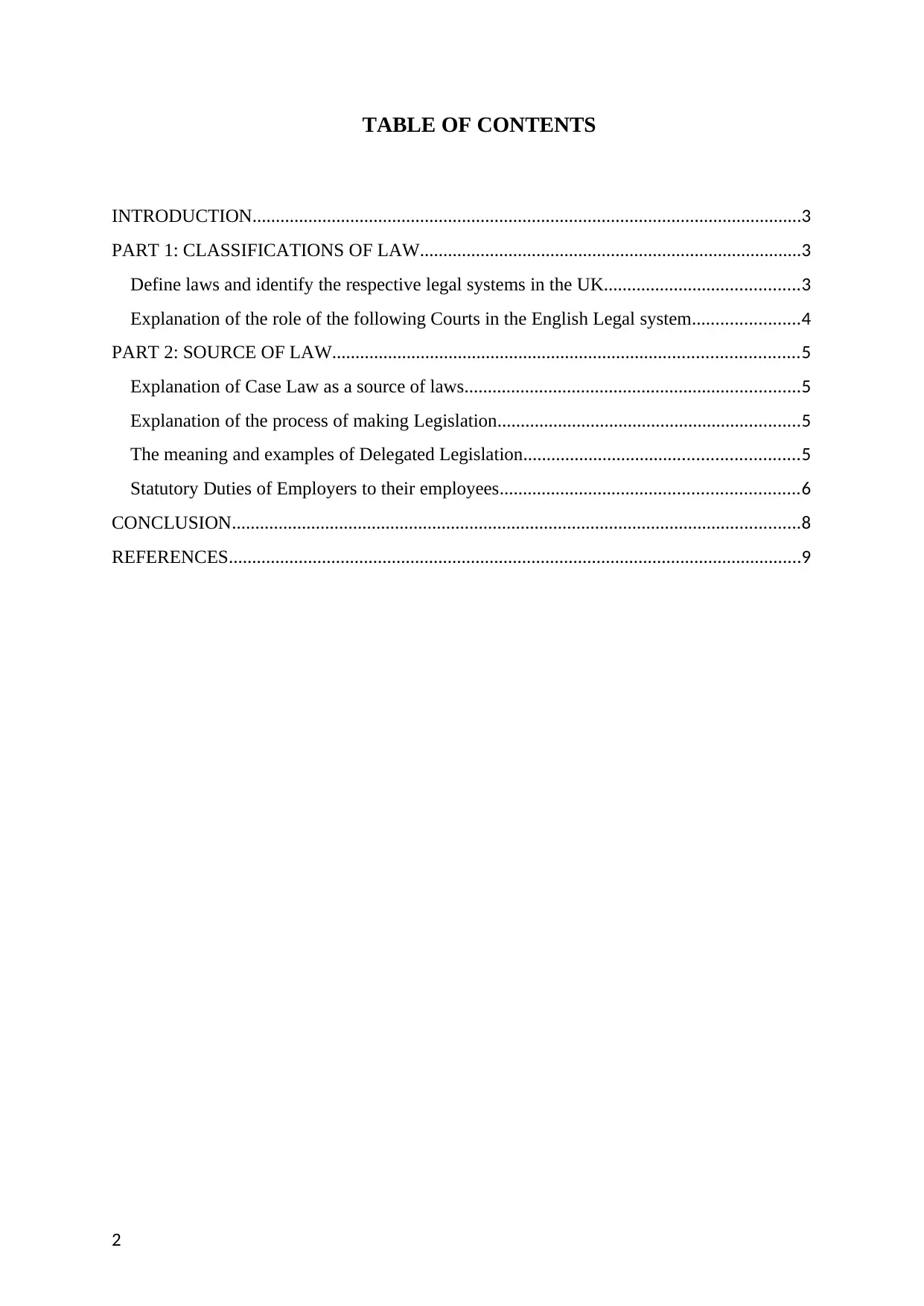
TABLE OF CONTENTS
INTRODUCTION......................................................................................................................3
PART 1: CLASSIFICATIONS OF LAW..................................................................................3
Define laws and identify the respective legal systems in the UK..........................................3
Explanation of the role of the following Courts in the English Legal system.......................4
PART 2: SOURCE OF LAW....................................................................................................5
Explanation of Case Law as a source of laws........................................................................5
Explanation of the process of making Legislation.................................................................5
The meaning and examples of Delegated Legislation...........................................................5
Statutory Duties of Employers to their employees................................................................6
CONCLUSION..........................................................................................................................8
REFERENCES...........................................................................................................................9
2
INTRODUCTION......................................................................................................................3
PART 1: CLASSIFICATIONS OF LAW..................................................................................3
Define laws and identify the respective legal systems in the UK..........................................3
Explanation of the role of the following Courts in the English Legal system.......................4
PART 2: SOURCE OF LAW....................................................................................................5
Explanation of Case Law as a source of laws........................................................................5
Explanation of the process of making Legislation.................................................................5
The meaning and examples of Delegated Legislation...........................................................5
Statutory Duties of Employers to their employees................................................................6
CONCLUSION..........................................................................................................................8
REFERENCES...........................................................................................................................9
2
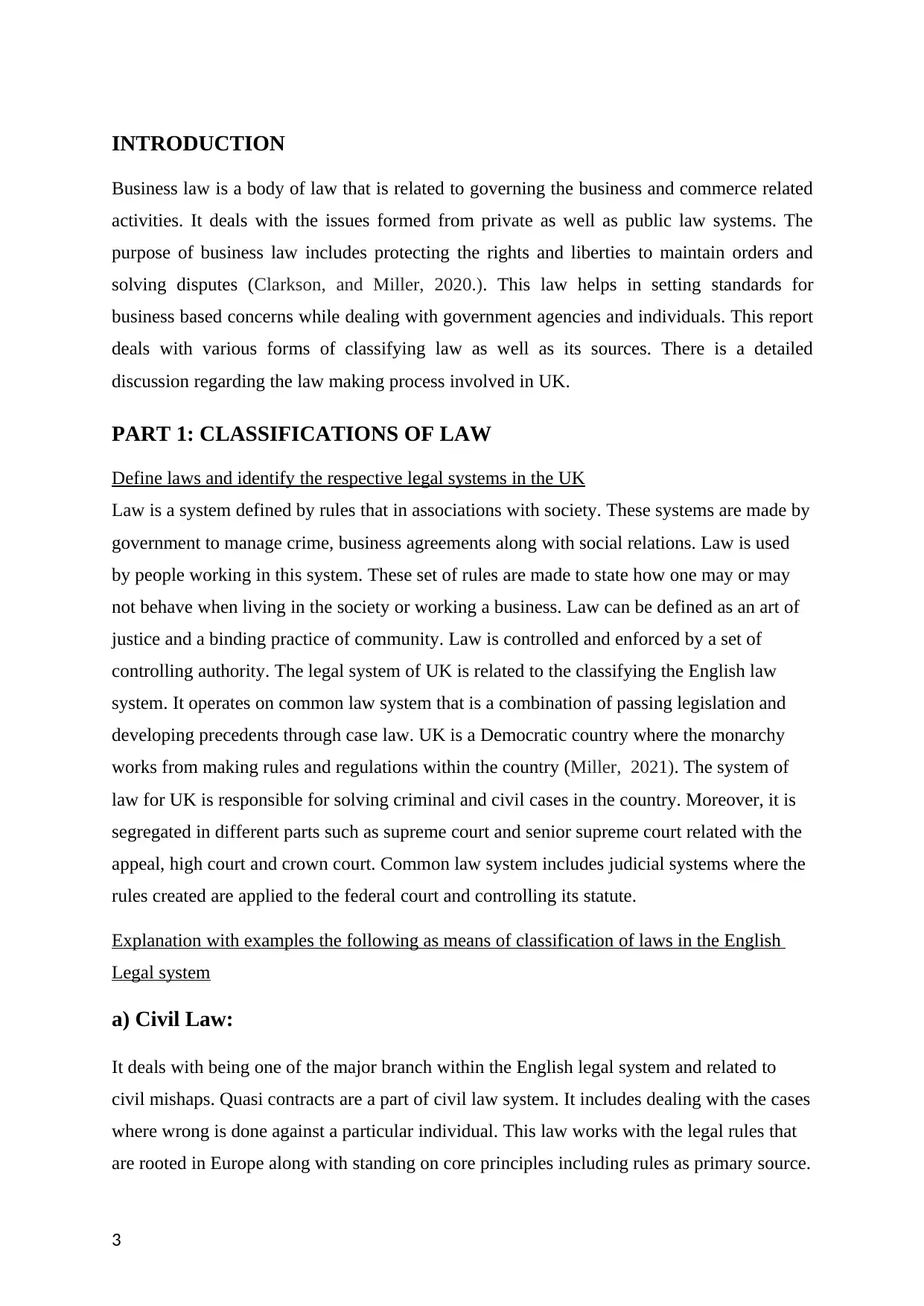
INTRODUCTION
Business law is a body of law that is related to governing the business and commerce related
activities. It deals with the issues formed from private as well as public law systems. The
purpose of business law includes protecting the rights and liberties to maintain orders and
solving disputes (Clarkson, and Miller, 2020.). This law helps in setting standards for
business based concerns while dealing with government agencies and individuals. This report
deals with various forms of classifying law as well as its sources. There is a detailed
discussion regarding the law making process involved in UK.
PART 1: CLASSIFICATIONS OF LAW
Define laws and identify the respective legal systems in the UK
Law is a system defined by rules that in associations with society. These systems are made by
government to manage crime, business agreements along with social relations. Law is used
by people working in this system. These set of rules are made to state how one may or may
not behave when living in the society or working a business. Law can be defined as an art of
justice and a binding practice of community. Law is controlled and enforced by a set of
controlling authority. The legal system of UK is related to the classifying the English law
system. It operates on common law system that is a combination of passing legislation and
developing precedents through case law. UK is a Democratic country where the monarchy
works from making rules and regulations within the country (Miller, 2021). The system of
law for UK is responsible for solving criminal and civil cases in the country. Moreover, it is
segregated in different parts such as supreme court and senior supreme court related with the
appeal, high court and crown court. Common law system includes judicial systems where the
rules created are applied to the federal court and controlling its statute.
Explanation with examples the following as means of classification of laws in the English
Legal system
a) Civil Law:
It deals with being one of the major branch within the English legal system and related to
civil mishaps. Quasi contracts are a part of civil law system. It includes dealing with the cases
where wrong is done against a particular individual. This law works with the legal rules that
are rooted in Europe along with standing on core principles including rules as primary source.
3
Business law is a body of law that is related to governing the business and commerce related
activities. It deals with the issues formed from private as well as public law systems. The
purpose of business law includes protecting the rights and liberties to maintain orders and
solving disputes (Clarkson, and Miller, 2020.). This law helps in setting standards for
business based concerns while dealing with government agencies and individuals. This report
deals with various forms of classifying law as well as its sources. There is a detailed
discussion regarding the law making process involved in UK.
PART 1: CLASSIFICATIONS OF LAW
Define laws and identify the respective legal systems in the UK
Law is a system defined by rules that in associations with society. These systems are made by
government to manage crime, business agreements along with social relations. Law is used
by people working in this system. These set of rules are made to state how one may or may
not behave when living in the society or working a business. Law can be defined as an art of
justice and a binding practice of community. Law is controlled and enforced by a set of
controlling authority. The legal system of UK is related to the classifying the English law
system. It operates on common law system that is a combination of passing legislation and
developing precedents through case law. UK is a Democratic country where the monarchy
works from making rules and regulations within the country (Miller, 2021). The system of
law for UK is responsible for solving criminal and civil cases in the country. Moreover, it is
segregated in different parts such as supreme court and senior supreme court related with the
appeal, high court and crown court. Common law system includes judicial systems where the
rules created are applied to the federal court and controlling its statute.
Explanation with examples the following as means of classification of laws in the English
Legal system
a) Civil Law:
It deals with being one of the major branch within the English legal system and related to
civil mishaps. Quasi contracts are a part of civil law system. It includes dealing with the cases
where wrong is done against a particular individual. This law works with the legal rules that
are rooted in Europe along with standing on core principles including rules as primary source.
3
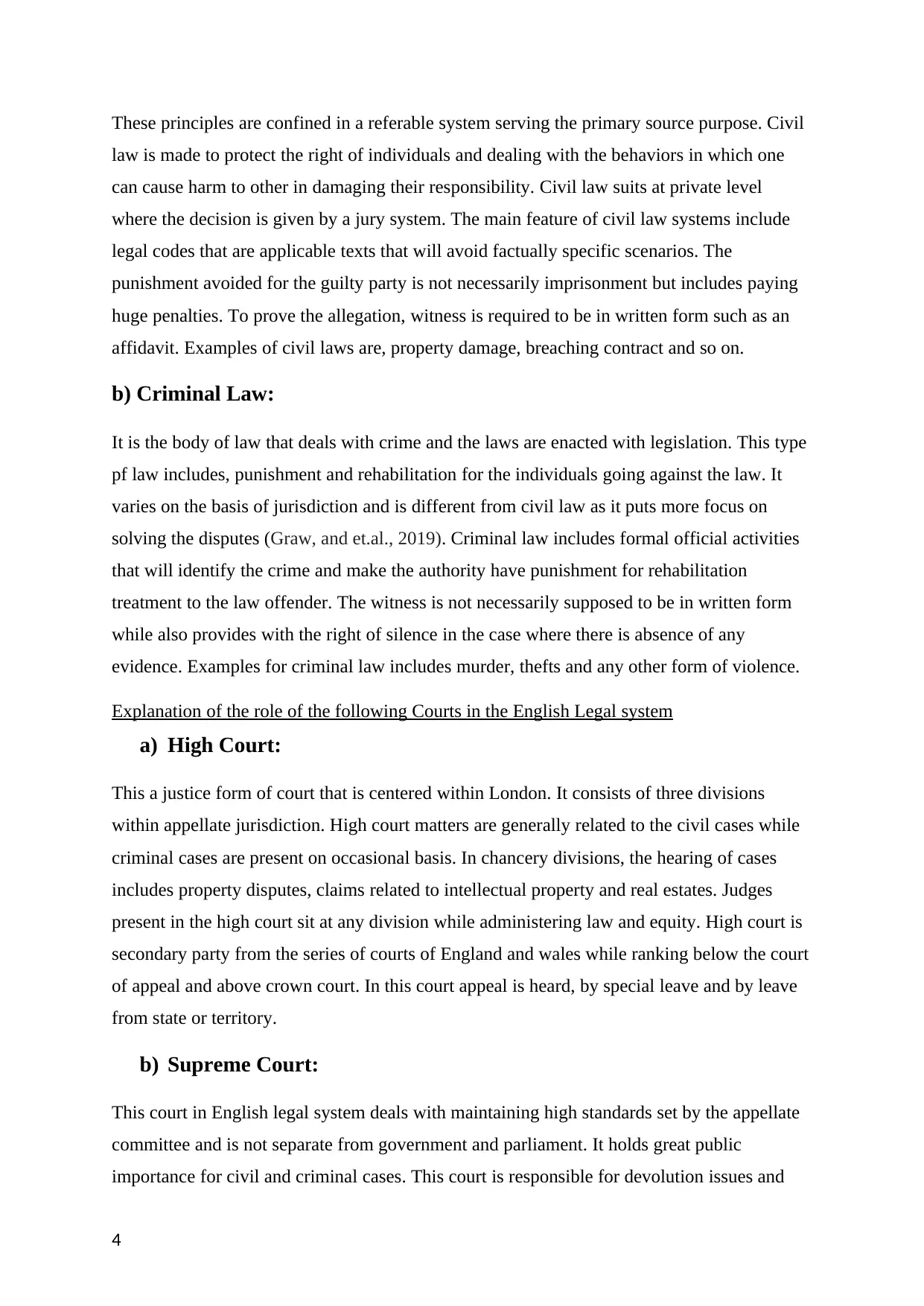
These principles are confined in a referable system serving the primary source purpose. Civil
law is made to protect the right of individuals and dealing with the behaviors in which one
can cause harm to other in damaging their responsibility. Civil law suits at private level
where the decision is given by a jury system. The main feature of civil law systems include
legal codes that are applicable texts that will avoid factually specific scenarios. The
punishment avoided for the guilty party is not necessarily imprisonment but includes paying
huge penalties. To prove the allegation, witness is required to be in written form such as an
affidavit. Examples of civil laws are, property damage, breaching contract and so on.
b) Criminal Law:
It is the body of law that deals with crime and the laws are enacted with legislation. This type
pf law includes, punishment and rehabilitation for the individuals going against the law. It
varies on the basis of jurisdiction and is different from civil law as it puts more focus on
solving the disputes (Graw, and et.al., 2019). Criminal law includes formal official activities
that will identify the crime and make the authority have punishment for rehabilitation
treatment to the law offender. The witness is not necessarily supposed to be in written form
while also provides with the right of silence in the case where there is absence of any
evidence. Examples for criminal law includes murder, thefts and any other form of violence.
Explanation of the role of the following Courts in the English Legal system
a) High Court:
This a justice form of court that is centered within London. It consists of three divisions
within appellate jurisdiction. High court matters are generally related to the civil cases while
criminal cases are present on occasional basis. In chancery divisions, the hearing of cases
includes property disputes, claims related to intellectual property and real estates. Judges
present in the high court sit at any division while administering law and equity. High court is
secondary party from the series of courts of England and wales while ranking below the court
of appeal and above crown court. In this court appeal is heard, by special leave and by leave
from state or territory.
b) Supreme Court:
This court in English legal system deals with maintaining high standards set by the appellate
committee and is not separate from government and parliament. It holds great public
importance for civil and criminal cases. This court is responsible for devolution issues and
4
law is made to protect the right of individuals and dealing with the behaviors in which one
can cause harm to other in damaging their responsibility. Civil law suits at private level
where the decision is given by a jury system. The main feature of civil law systems include
legal codes that are applicable texts that will avoid factually specific scenarios. The
punishment avoided for the guilty party is not necessarily imprisonment but includes paying
huge penalties. To prove the allegation, witness is required to be in written form such as an
affidavit. Examples of civil laws are, property damage, breaching contract and so on.
b) Criminal Law:
It is the body of law that deals with crime and the laws are enacted with legislation. This type
pf law includes, punishment and rehabilitation for the individuals going against the law. It
varies on the basis of jurisdiction and is different from civil law as it puts more focus on
solving the disputes (Graw, and et.al., 2019). Criminal law includes formal official activities
that will identify the crime and make the authority have punishment for rehabilitation
treatment to the law offender. The witness is not necessarily supposed to be in written form
while also provides with the right of silence in the case where there is absence of any
evidence. Examples for criminal law includes murder, thefts and any other form of violence.
Explanation of the role of the following Courts in the English Legal system
a) High Court:
This a justice form of court that is centered within London. It consists of three divisions
within appellate jurisdiction. High court matters are generally related to the civil cases while
criminal cases are present on occasional basis. In chancery divisions, the hearing of cases
includes property disputes, claims related to intellectual property and real estates. Judges
present in the high court sit at any division while administering law and equity. High court is
secondary party from the series of courts of England and wales while ranking below the court
of appeal and above crown court. In this court appeal is heard, by special leave and by leave
from state or territory.
b) Supreme Court:
This court in English legal system deals with maintaining high standards set by the appellate
committee and is not separate from government and parliament. It holds great public
importance for civil and criminal cases. This court is responsible for devolution issues and
4
Secure Best Marks with AI Grader
Need help grading? Try our AI Grader for instant feedback on your assignments.
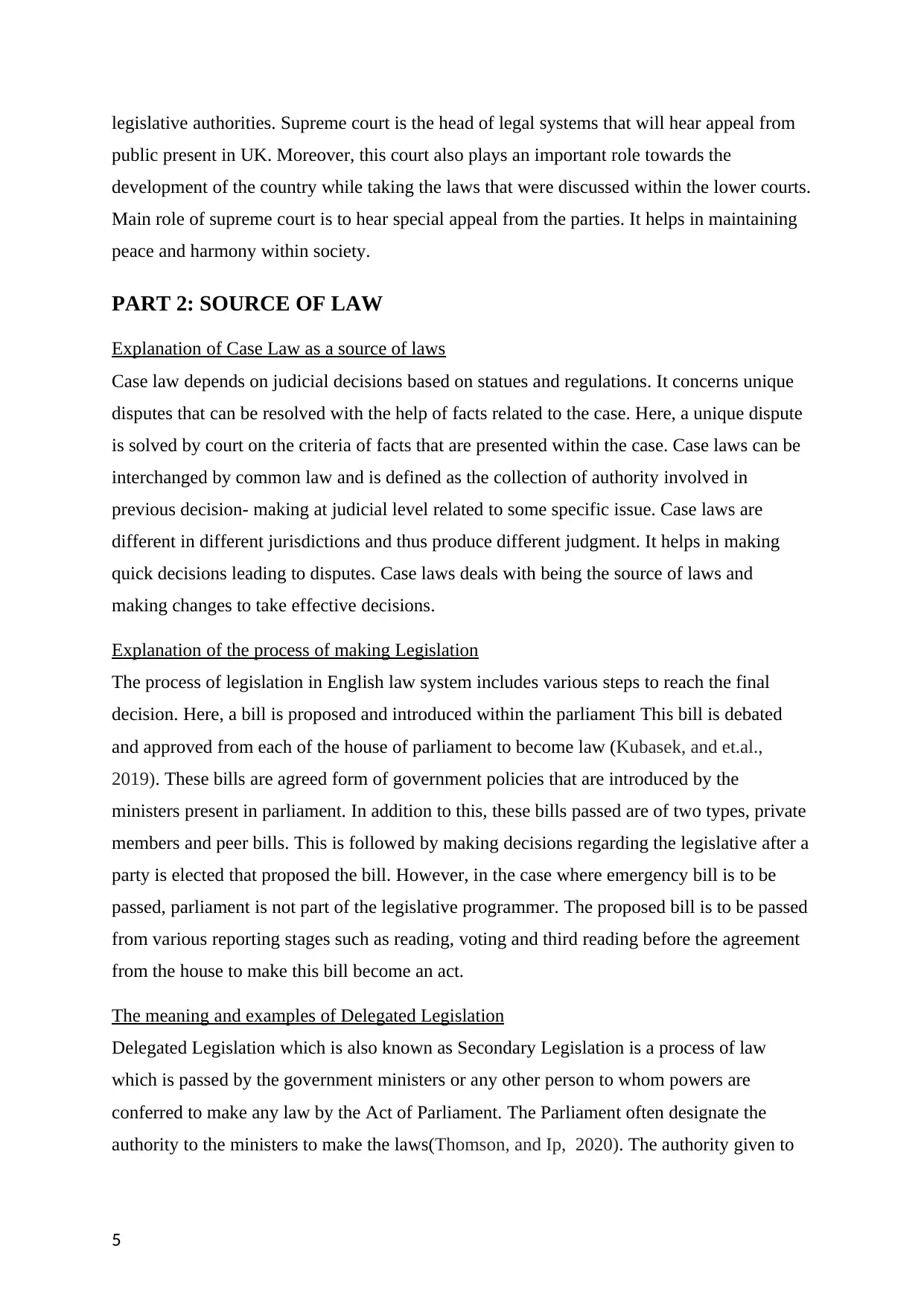
legislative authorities. Supreme court is the head of legal systems that will hear appeal from
public present in UK. Moreover, this court also plays an important role towards the
development of the country while taking the laws that were discussed within the lower courts.
Main role of supreme court is to hear special appeal from the parties. It helps in maintaining
peace and harmony within society.
PART 2: SOURCE OF LAW
Explanation of Case Law as a source of laws
Case law depends on judicial decisions based on statues and regulations. It concerns unique
disputes that can be resolved with the help of facts related to the case. Here, a unique dispute
is solved by court on the criteria of facts that are presented within the case. Case laws can be
interchanged by common law and is defined as the collection of authority involved in
previous decision- making at judicial level related to some specific issue. Case laws are
different in different jurisdictions and thus produce different judgment. It helps in making
quick decisions leading to disputes. Case laws deals with being the source of laws and
making changes to take effective decisions.
Explanation of the process of making Legislation
The process of legislation in English law system includes various steps to reach the final
decision. Here, a bill is proposed and introduced within the parliament This bill is debated
and approved from each of the house of parliament to become law (Kubasek, and et.al.,
2019). These bills are agreed form of government policies that are introduced by the
ministers present in parliament. In addition to this, these bills passed are of two types, private
members and peer bills. This is followed by making decisions regarding the legislative after a
party is elected that proposed the bill. However, in the case where emergency bill is to be
passed, parliament is not part of the legislative programmer. The proposed bill is to be passed
from various reporting stages such as reading, voting and third reading before the agreement
from the house to make this bill become an act.
The meaning and examples of Delegated Legislation
Delegated Legislation which is also known as Secondary Legislation is a process of law
which is passed by the government ministers or any other person to whom powers are
conferred to make any law by the Act of Parliament. The Parliament often designate the
authority to the ministers to make the laws(Thomson, and Ip, 2020). The authority given to
5
public present in UK. Moreover, this court also plays an important role towards the
development of the country while taking the laws that were discussed within the lower courts.
Main role of supreme court is to hear special appeal from the parties. It helps in maintaining
peace and harmony within society.
PART 2: SOURCE OF LAW
Explanation of Case Law as a source of laws
Case law depends on judicial decisions based on statues and regulations. It concerns unique
disputes that can be resolved with the help of facts related to the case. Here, a unique dispute
is solved by court on the criteria of facts that are presented within the case. Case laws can be
interchanged by common law and is defined as the collection of authority involved in
previous decision- making at judicial level related to some specific issue. Case laws are
different in different jurisdictions and thus produce different judgment. It helps in making
quick decisions leading to disputes. Case laws deals with being the source of laws and
making changes to take effective decisions.
Explanation of the process of making Legislation
The process of legislation in English law system includes various steps to reach the final
decision. Here, a bill is proposed and introduced within the parliament This bill is debated
and approved from each of the house of parliament to become law (Kubasek, and et.al.,
2019). These bills are agreed form of government policies that are introduced by the
ministers present in parliament. In addition to this, these bills passed are of two types, private
members and peer bills. This is followed by making decisions regarding the legislative after a
party is elected that proposed the bill. However, in the case where emergency bill is to be
passed, parliament is not part of the legislative programmer. The proposed bill is to be passed
from various reporting stages such as reading, voting and third reading before the agreement
from the house to make this bill become an act.
The meaning and examples of Delegated Legislation
Delegated Legislation which is also known as Secondary Legislation is a process of law
which is passed by the government ministers or any other person to whom powers are
conferred to make any law by the Act of Parliament. The Parliament often designate the
authority to the ministers to make the laws(Thomson, and Ip, 2020). The authority given to
5
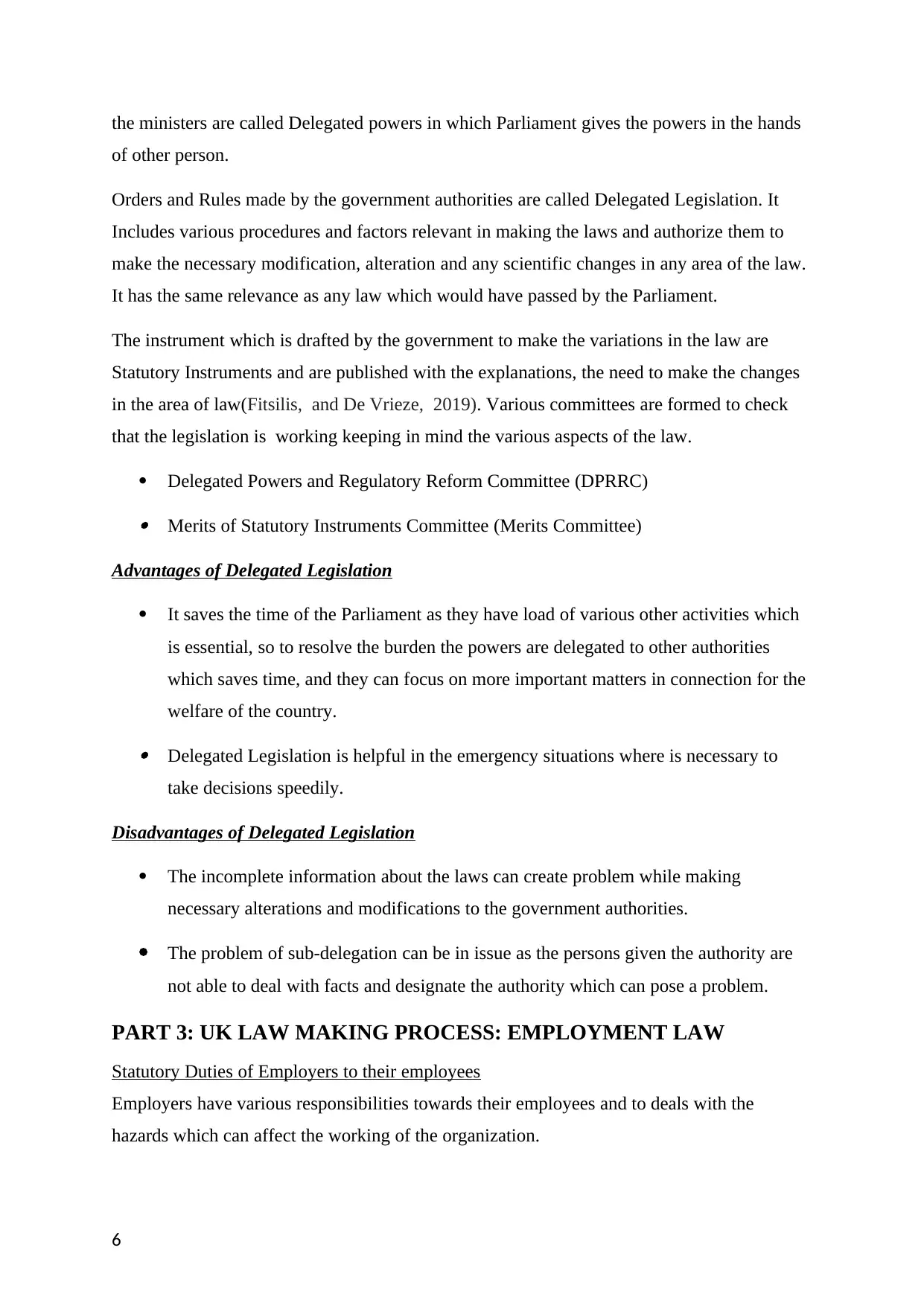
the ministers are called Delegated powers in which Parliament gives the powers in the hands
of other person.
Orders and Rules made by the government authorities are called Delegated Legislation. It
Includes various procedures and factors relevant in making the laws and authorize them to
make the necessary modification, alteration and any scientific changes in any area of the law.
It has the same relevance as any law which would have passed by the Parliament.
The instrument which is drafted by the government to make the variations in the law are
Statutory Instruments and are published with the explanations, the need to make the changes
in the area of law(Fitsilis, and De Vrieze, 2019). Various committees are formed to check
that the legislation is working keeping in mind the various aspects of the law.
Delegated Powers and Regulatory Reform Committee (DPRRC) Merits of Statutory Instruments Committee (Merits Committee)
Advantages of Delegated Legislation
It saves the time of the Parliament as they have load of various other activities which
is essential, so to resolve the burden the powers are delegated to other authorities
which saves time, and they can focus on more important matters in connection for the
welfare of the country. Delegated Legislation is helpful in the emergency situations where is necessary to
take decisions speedily.
Disadvantages of Delegated Legislation
The incomplete information about the laws can create problem while making
necessary alterations and modifications to the government authorities.
The problem of sub-delegation can be in issue as the persons given the authority are
not able to deal with facts and designate the authority which can pose a problem.
PART 3: UK LAW MAKING PROCESS: EMPLOYMENT LAW
Statutory Duties of Employers to their employees
Employers have various responsibilities towards their employees and to deals with the
hazards which can affect the working of the organization.
6
of other person.
Orders and Rules made by the government authorities are called Delegated Legislation. It
Includes various procedures and factors relevant in making the laws and authorize them to
make the necessary modification, alteration and any scientific changes in any area of the law.
It has the same relevance as any law which would have passed by the Parliament.
The instrument which is drafted by the government to make the variations in the law are
Statutory Instruments and are published with the explanations, the need to make the changes
in the area of law(Fitsilis, and De Vrieze, 2019). Various committees are formed to check
that the legislation is working keeping in mind the various aspects of the law.
Delegated Powers and Regulatory Reform Committee (DPRRC) Merits of Statutory Instruments Committee (Merits Committee)
Advantages of Delegated Legislation
It saves the time of the Parliament as they have load of various other activities which
is essential, so to resolve the burden the powers are delegated to other authorities
which saves time, and they can focus on more important matters in connection for the
welfare of the country. Delegated Legislation is helpful in the emergency situations where is necessary to
take decisions speedily.
Disadvantages of Delegated Legislation
The incomplete information about the laws can create problem while making
necessary alterations and modifications to the government authorities.
The problem of sub-delegation can be in issue as the persons given the authority are
not able to deal with facts and designate the authority which can pose a problem.
PART 3: UK LAW MAKING PROCESS: EMPLOYMENT LAW
Statutory Duties of Employers to their employees
Employers have various responsibilities towards their employees and to deals with the
hazards which can affect the working of the organization.
6
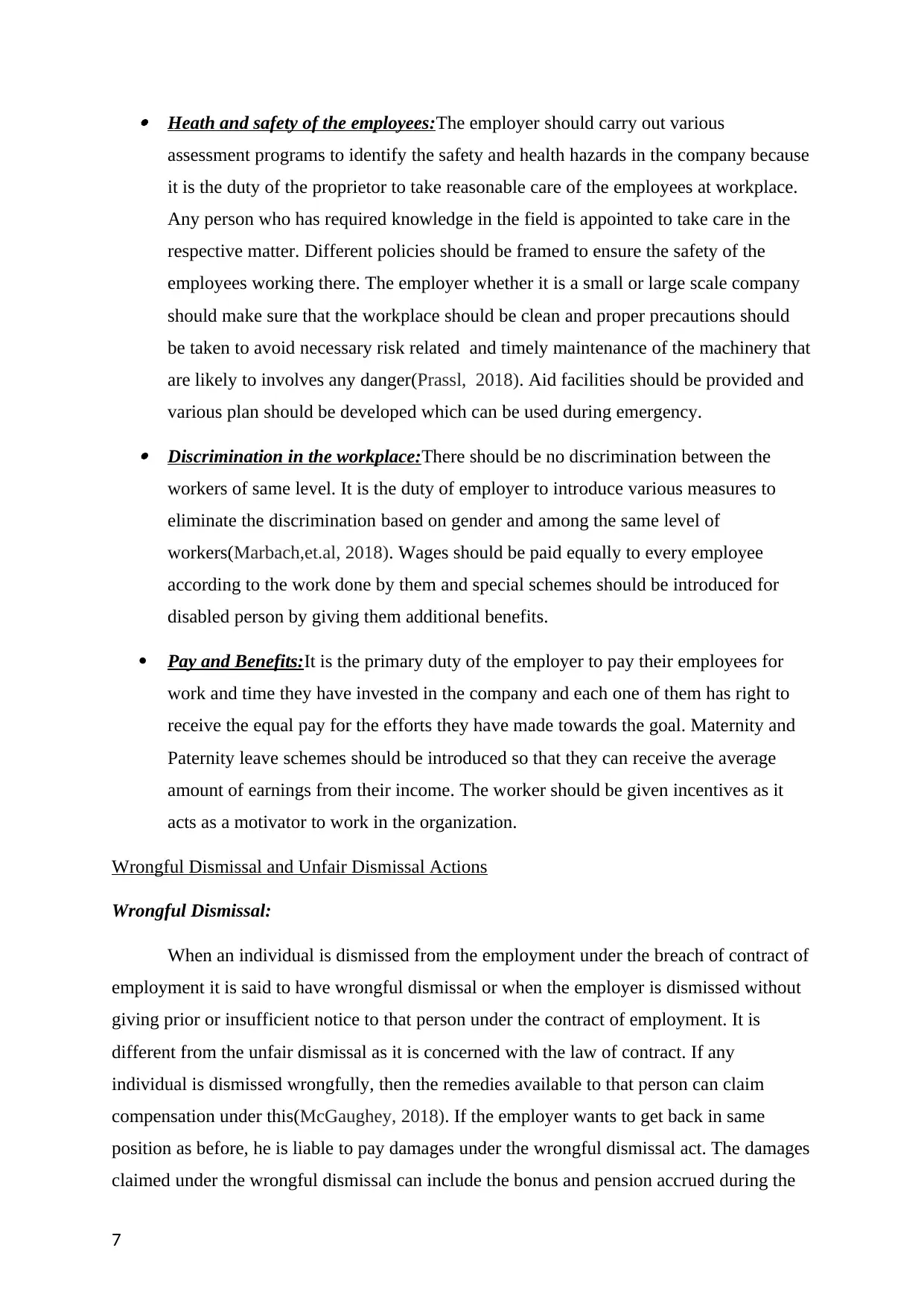
Heath and safety of the employees:The employer should carry out various
assessment programs to identify the safety and health hazards in the company because
it is the duty of the proprietor to take reasonable care of the employees at workplace.
Any person who has required knowledge in the field is appointed to take care in the
respective matter. Different policies should be framed to ensure the safety of the
employees working there. The employer whether it is a small or large scale company
should make sure that the workplace should be clean and proper precautions should
be taken to avoid necessary risk related and timely maintenance of the machinery that
are likely to involves any danger(Prassl, 2018). Aid facilities should be provided and
various plan should be developed which can be used during emergency. Discrimination in the workplace:There should be no discrimination between the
workers of same level. It is the duty of employer to introduce various measures to
eliminate the discrimination based on gender and among the same level of
workers(Marbach,et.al, 2018). Wages should be paid equally to every employee
according to the work done by them and special schemes should be introduced for
disabled person by giving them additional benefits.
Pay and Benefits:It is the primary duty of the employer to pay their employees for
work and time they have invested in the company and each one of them has right to
receive the equal pay for the efforts they have made towards the goal. Maternity and
Paternity leave schemes should be introduced so that they can receive the average
amount of earnings from their income. The worker should be given incentives as it
acts as a motivator to work in the organization.
Wrongful Dismissal and Unfair Dismissal Actions
Wrongful Dismissal:
When an individual is dismissed from the employment under the breach of contract of
employment it is said to have wrongful dismissal or when the employer is dismissed without
giving prior or insufficient notice to that person under the contract of employment. It is
different from the unfair dismissal as it is concerned with the law of contract. If any
individual is dismissed wrongfully, then the remedies available to that person can claim
compensation under this(McGaughey, 2018). If the employer wants to get back in same
position as before, he is liable to pay damages under the wrongful dismissal act. The damages
claimed under the wrongful dismissal can include the bonus and pension accrued during the
7
assessment programs to identify the safety and health hazards in the company because
it is the duty of the proprietor to take reasonable care of the employees at workplace.
Any person who has required knowledge in the field is appointed to take care in the
respective matter. Different policies should be framed to ensure the safety of the
employees working there. The employer whether it is a small or large scale company
should make sure that the workplace should be clean and proper precautions should
be taken to avoid necessary risk related and timely maintenance of the machinery that
are likely to involves any danger(Prassl, 2018). Aid facilities should be provided and
various plan should be developed which can be used during emergency. Discrimination in the workplace:There should be no discrimination between the
workers of same level. It is the duty of employer to introduce various measures to
eliminate the discrimination based on gender and among the same level of
workers(Marbach,et.al, 2018). Wages should be paid equally to every employee
according to the work done by them and special schemes should be introduced for
disabled person by giving them additional benefits.
Pay and Benefits:It is the primary duty of the employer to pay their employees for
work and time they have invested in the company and each one of them has right to
receive the equal pay for the efforts they have made towards the goal. Maternity and
Paternity leave schemes should be introduced so that they can receive the average
amount of earnings from their income. The worker should be given incentives as it
acts as a motivator to work in the organization.
Wrongful Dismissal and Unfair Dismissal Actions
Wrongful Dismissal:
When an individual is dismissed from the employment under the breach of contract of
employment it is said to have wrongful dismissal or when the employer is dismissed without
giving prior or insufficient notice to that person under the contract of employment. It is
different from the unfair dismissal as it is concerned with the law of contract. If any
individual is dismissed wrongfully, then the remedies available to that person can claim
compensation under this(McGaughey, 2018). If the employer wants to get back in same
position as before, he is liable to pay damages under the wrongful dismissal act. The damages
claimed under the wrongful dismissal can include the bonus and pension accrued during the
7
Paraphrase This Document
Need a fresh take? Get an instant paraphrase of this document with our AI Paraphraser
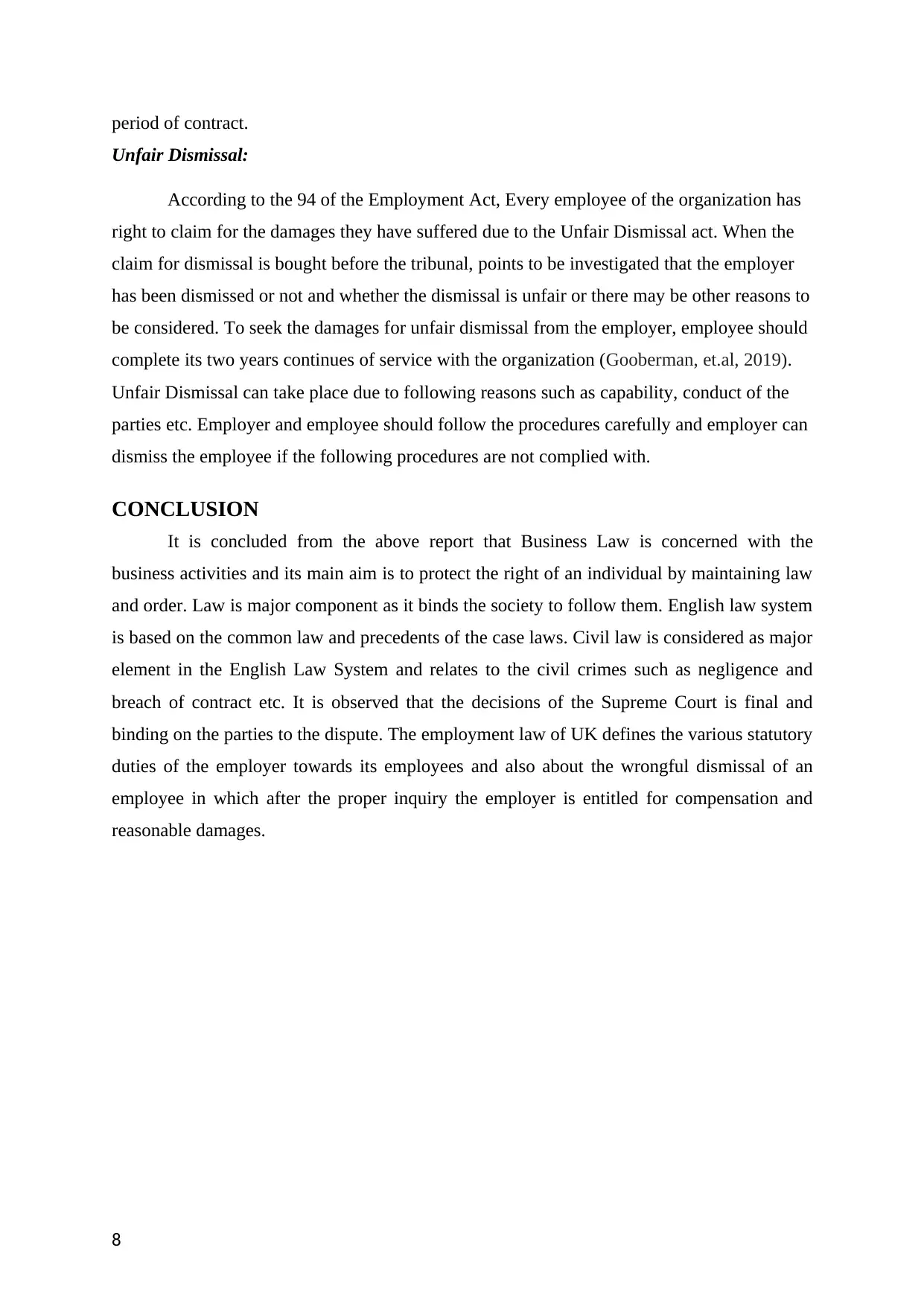
period of contract.
Unfair Dismissal:
According to the 94 of the Employment Act, Every employee of the organization has
right to claim for the damages they have suffered due to the Unfair Dismissal act. When the
claim for dismissal is bought before the tribunal, points to be investigated that the employer
has been dismissed or not and whether the dismissal is unfair or there may be other reasons to
be considered. To seek the damages for unfair dismissal from the employer, employee should
complete its two years continues of service with the organization (Gooberman, et.al, 2019).
Unfair Dismissal can take place due to following reasons such as capability, conduct of the
parties etc. Employer and employee should follow the procedures carefully and employer can
dismiss the employee if the following procedures are not complied with.
CONCLUSION
It is concluded from the above report that Business Law is concerned with the
business activities and its main aim is to protect the right of an individual by maintaining law
and order. Law is major component as it binds the society to follow them. English law system
is based on the common law and precedents of the case laws. Civil law is considered as major
element in the English Law System and relates to the civil crimes such as negligence and
breach of contract etc. It is observed that the decisions of the Supreme Court is final and
binding on the parties to the dispute. The employment law of UK defines the various statutory
duties of the employer towards its employees and also about the wrongful dismissal of an
employee in which after the proper inquiry the employer is entitled for compensation and
reasonable damages.
8
Unfair Dismissal:
According to the 94 of the Employment Act, Every employee of the organization has
right to claim for the damages they have suffered due to the Unfair Dismissal act. When the
claim for dismissal is bought before the tribunal, points to be investigated that the employer
has been dismissed or not and whether the dismissal is unfair or there may be other reasons to
be considered. To seek the damages for unfair dismissal from the employer, employee should
complete its two years continues of service with the organization (Gooberman, et.al, 2019).
Unfair Dismissal can take place due to following reasons such as capability, conduct of the
parties etc. Employer and employee should follow the procedures carefully and employer can
dismiss the employee if the following procedures are not complied with.
CONCLUSION
It is concluded from the above report that Business Law is concerned with the
business activities and its main aim is to protect the right of an individual by maintaining law
and order. Law is major component as it binds the society to follow them. English law system
is based on the common law and precedents of the case laws. Civil law is considered as major
element in the English Law System and relates to the civil crimes such as negligence and
breach of contract etc. It is observed that the decisions of the Supreme Court is final and
binding on the parties to the dispute. The employment law of UK defines the various statutory
duties of the employer towards its employees and also about the wrongful dismissal of an
employee in which after the proper inquiry the employer is entitled for compensation and
reasonable damages.
8
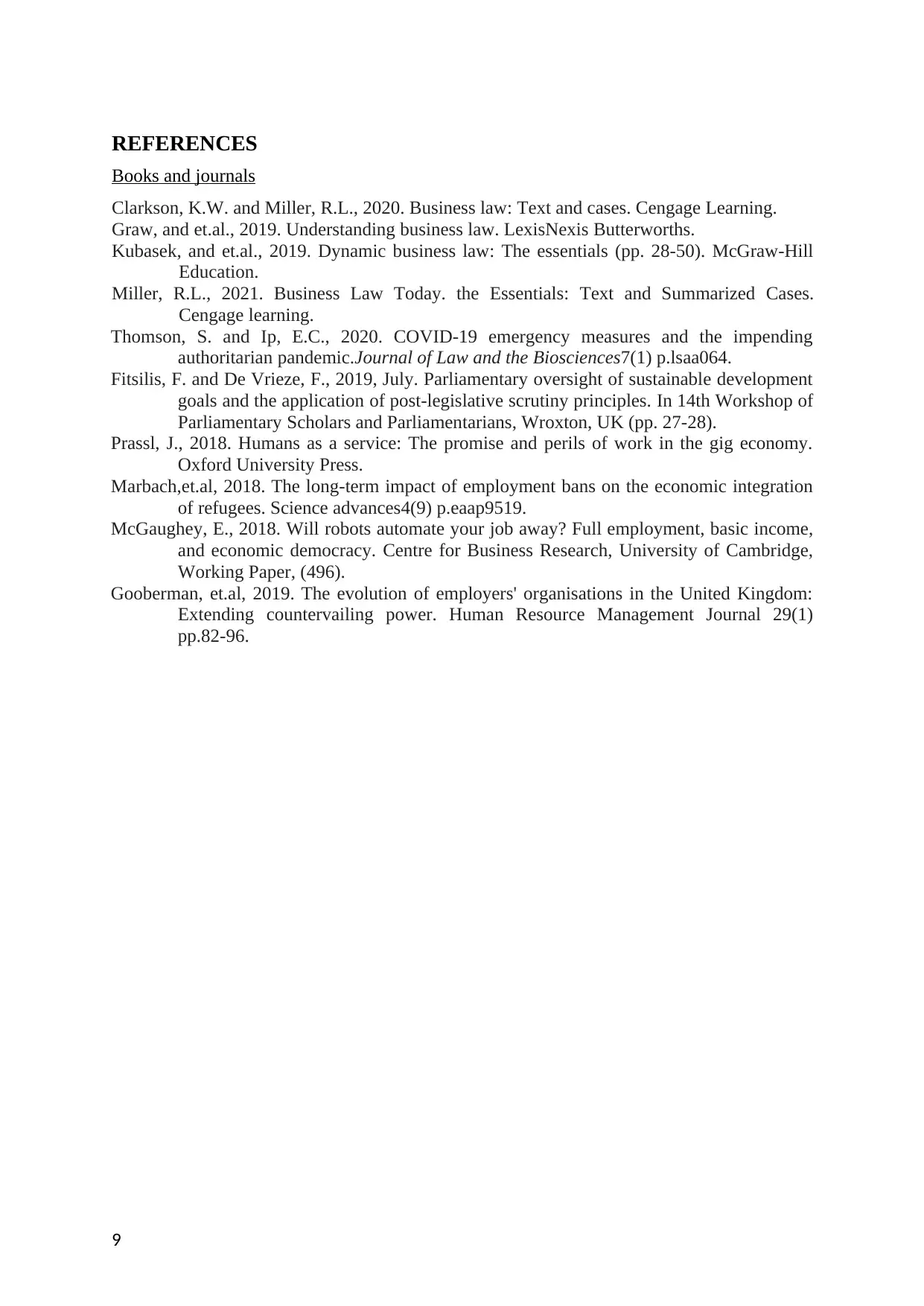
REFERENCES
Books and journals
Clarkson, K.W. and Miller, R.L., 2020. Business law: Text and cases. Cengage Learning.
Graw, and et.al., 2019. Understanding business law. LexisNexis Butterworths.
Kubasek, and et.al., 2019. Dynamic business law: The essentials (pp. 28-50). McGraw-Hill
Education.
Miller, R.L., 2021. Business Law Today. the Essentials: Text and Summarized Cases.
Cengage learning.
Thomson, S. and Ip, E.C., 2020. COVID-19 emergency measures and the impending
authoritarian pandemic.Journal of Law and the Biosciences7(1) p.lsaa064.
Fitsilis, F. and De Vrieze, F., 2019, July. Parliamentary oversight of sustainable development
goals and the application of post-legislative scrutiny principles. In 14th Workshop of
Parliamentary Scholars and Parliamentarians, Wroxton, UK (pp. 27-28).
Prassl, J., 2018. Humans as a service: The promise and perils of work in the gig economy.
Oxford University Press.
Marbach,et.al, 2018. The long-term impact of employment bans on the economic integration
of refugees. Science advances4(9) p.eaap9519.
McGaughey, E., 2018. Will robots automate your job away? Full employment, basic income,
and economic democracy. Centre for Business Research, University of Cambridge,
Working Paper, (496).
Gooberman, et.al, 2019. The evolution of employers' organisations in the United Kingdom:
Extending countervailing power. Human Resource Management Journal 29(1)
pp.82-96.
9
Books and journals
Clarkson, K.W. and Miller, R.L., 2020. Business law: Text and cases. Cengage Learning.
Graw, and et.al., 2019. Understanding business law. LexisNexis Butterworths.
Kubasek, and et.al., 2019. Dynamic business law: The essentials (pp. 28-50). McGraw-Hill
Education.
Miller, R.L., 2021. Business Law Today. the Essentials: Text and Summarized Cases.
Cengage learning.
Thomson, S. and Ip, E.C., 2020. COVID-19 emergency measures and the impending
authoritarian pandemic.Journal of Law and the Biosciences7(1) p.lsaa064.
Fitsilis, F. and De Vrieze, F., 2019, July. Parliamentary oversight of sustainable development
goals and the application of post-legislative scrutiny principles. In 14th Workshop of
Parliamentary Scholars and Parliamentarians, Wroxton, UK (pp. 27-28).
Prassl, J., 2018. Humans as a service: The promise and perils of work in the gig economy.
Oxford University Press.
Marbach,et.al, 2018. The long-term impact of employment bans on the economic integration
of refugees. Science advances4(9) p.eaap9519.
McGaughey, E., 2018. Will robots automate your job away? Full employment, basic income,
and economic democracy. Centre for Business Research, University of Cambridge,
Working Paper, (496).
Gooberman, et.al, 2019. The evolution of employers' organisations in the United Kingdom:
Extending countervailing power. Human Resource Management Journal 29(1)
pp.82-96.
9
1 out of 9
Related Documents
Your All-in-One AI-Powered Toolkit for Academic Success.
+13062052269
info@desklib.com
Available 24*7 on WhatsApp / Email
![[object Object]](/_next/static/media/star-bottom.7253800d.svg)
Unlock your academic potential
© 2024 | Zucol Services PVT LTD | All rights reserved.


